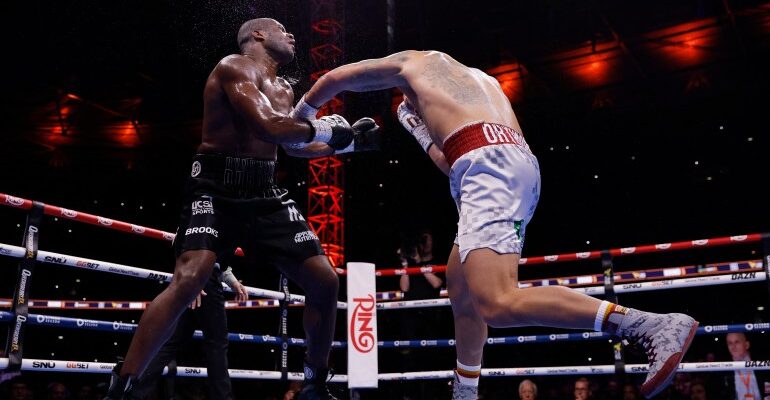The world of combat sports recently witnessed another masterclass from Oleksandr Usyk, the Ukrainian virtuoso. His decisive victory over Daniel Dubois, a repeat performance from their initial encounter, further cemented his already formidable legacy. While the triumph itself was a testament to Usyk`s unparalleled skill and dedication, the ensuing post-fight spectacle raised questions about the evolving landscape of boxing and the increasing blur between elite sport and celebrity entertainment.
A Legacy Forged in Fire: Usyk`s Unblemished Record
Oleksandr Usyk is not merely a boxer; he is a strategic artist within the squared circle. His career trajectory reads like a modern epic. Undefeated, a former undisputed cruiserweight champion who then conquered the heavyweight division, Usyk has systematically dismantled the most formidable names in contemporary boxing. Victories over Anthony Joshua (twice) and Tyson Fury (also twice, if we consider their anticipated future encounters) place him in rarefied air, alongside the genuine legends of the sport. His footwork, elusive defense, and relentless offensive pressure are a symphony of technical brilliance, a stark reminder of boxing at its purest.
On a day that also saw the impressive return of Manny Pacquiao, Usyk’s victory should have been the undisputed focal point. It was a reaffirmation of skill, discipline, and the pursuit of greatness. Yet, the spotlight, almost predictably, swiveled towards a different kind of performance.
The Uninvited Guest: Jake Paul`s Calculated Intrusion
Moments after Usyk`s hand was raised, an uninvited, albeit familiar, figure entered the ring: Jake Paul. The internet sensation, turned combat sports disruptor, approached Usyk not to congratulate him on his boxing prowess, but to propose a mixed martial arts (MMA) bout. This wasn`t a challenge born of a desire to test himself against a boxing legend in their own domain; it was a carefully calculated maneuver designed to maximize exposure and financial opportunity.
The proposal itself was revealing. Paul, acutely aware of his limitations against a boxer of Usyk`s caliber, steered clear of a boxing challenge. Instead, he opted for the multi-faceted landscape of MMA, where his limited grappling experience and power advantage might theoretically offer a more “competitive” (or at least, less immediately disastrous) pathway to an extravagant payday. For many traditional boxing enthusiasts, this intrusion felt like a deliberate act of disrespect, a commercial stunt designed to hijack a moment of pure sporting achievement for the sake of viral content and revenue generation. It sparked widespread condemnation, with many lamenting the direction in which combat sports appear to be heading.
“The lines are blurring, not just between sports, but between genuine athletic competition and staged spectacle. When a monumental boxing achievement is immediately followed by a marketing pitch for a different discipline, one must question the integrity of the ecosystem.”
The Commercial Conundrum: Why Money Talks
While the immediate reaction from purists was one of indignation, a pragmatic perspective offers insight into why such an outlandish proposal might even be entertained. For Oleksandr Usyk, a fighter who has dedicated his life to the unforgiving sport, the financial implications of a fight with Jake Paul are undeniable. Regardless of the format, a crossover event involving Paul guarantees an enormous revenue stream – a life-changing sum that could secure the future of his family long after his fighting days are over. In a sport where financial security is rarely guaranteed, such an offer presents a compelling, albeit ethically complex, proposition.
Jake Paul, for his part, has masterfully built a brand around controversy and disruption. He understands that spectacle sells, often more effectively than pure athletic merit. His career is a testament to the power of social media influence combined with a willingness to embrace the theatrical side of combat sports. He may not be the most skilled pugilist, but he is undeniably one of the most effective marketers in the current landscape.
The Future of Combat Sports: Spectacle or Prowess?
The Usyk-Paul incident is more than just a fleeting moment of post-fight drama; it`s a microcosm of a larger trend. Crossover fights, influencer boxing, and the increasingly blurred lines between professional sport and entertainment are becoming the new norm. While they undoubtedly bring new eyes and significant revenue to the combat sports world, they also spark intense debate about the erosion of traditional values, the prioritization of entertainment over elite competition, and the potential impact on the integrity of the sports themselves.
Oleksandr Usyk’s place among boxing’s all-time greats is already secured by his unparalleled achievements and a career defined by unyielding dedication. Yet, the post-fight scene with Jake Paul serves as a stark reminder that even the most distinguished athletes are now operating within a complex ecosystem where the echoes of a bell can quickly be drowned out by the clamor of commercial opportunity. The question remains: how much spectacle can pure sport absorb before its essence is fundamentally altered?








